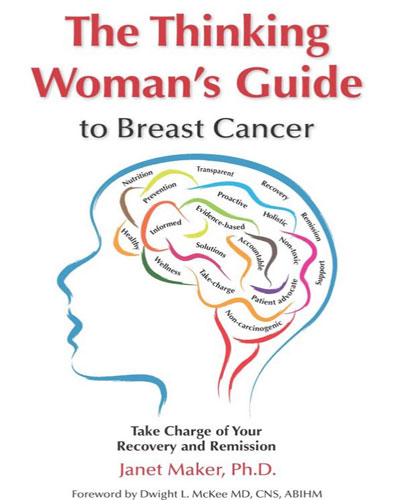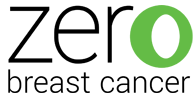The Thinking Woman's Guide to Breast Cancer by Janet Maker, PhD

Overview
The author Janet Maker, PhD is a retired college professor who holds a Ph.D. in Educational Psychology from University of Southern California, a M.S. in Social Work from Columbia University, and a B.A. in English from University of California, Los Angeles. Dr. Maker is also a breast cancer survivor who was diagnosed in 2011. This book chronicles her experiences and how she processed them based on her specific diagnosis, the presentation of her metastatic breast cancer and the diagnostic challenges that her ‘extremely dense’ breasts posed. Dr. Maker brings her formidable background, training and intellect to her quest for answers. Her tour de force book was published earlier in 2017. Dr. Maker is realistic yet hopeful, vulnerable and courageous in her journey and mission to inform and improve the lives of breast cancer patients. She makes every effort to explain potentially complicated words, phrases, and concepts to help the reader. Dr. Maker’s message to others facing breast cancer is to apply critical thinking, to never stop asking questions and to seek out organizations and individuals who empower patients to advocate for the best care possible. The sub-title of the book is ‘Take Charge of Your Recovery and Remission’. This is her call to action and she leads by example.
How the book is organized
The book takes the reader through Dr. Maker’s journey in chronological order. Certain clear themes emerge as she deals with the hierarchy of decisions that need to be made at the time of, or shortly after diagnosis and the author’s process for doing so. The author then moves on to topics that address longer term considerations that as a survivor she places the highest importance on; lifestyle modifications, self-education and advocacy. The first 5 chapters deal with diagnosis and active treatment, Chapter 6 ranges widely over the subject of hormones and the next 3 chapters delve into topics that touch on breast cancer risks and causes, breast cancer recurrence prevention and the possibilities of health and wellness (even for those with invasive or advanced disease). In the final chapter the author issues a detailed call for action. The book concludes with five appendices and copious references.
Chapters 1 and 2: Cancer Diagnosis and Finding Help
Dr. Maker describes her own process and journey by sharing lessons learned, frustrations and ‘aha’ moments. She explores the value of obtaining many medical opinions, networking with breast cancer patients and survivors, support groups, helpful websites, the importance of self-advocacy and of securing the services of a professional patient advocate. The author expounds on various oncology modalities including Integrative Oncology and Traditional Oncology. Dr. Maker concludes this section with the really important reminder that you should read everything before you sign – and getting someone you trust to look over the form with you is very good advice!
Chapters 3, 4 and 5: Surgery, Chemotherapy and Radiation
Dr. Maker explores and dissects the full range of surgical options that could possibly be faced by anyone with a breast cancer diagnosis. Lymphadenectomy, mastectomy, lumpectomy and breast reconstruction; the author comprehensively and unflinchingly examines risks and offers a road map to a realistic evaluative process before deciding on surgery. Dr. Maker then applies the same thorough and rigorous approach to the topics of chemotherapy and radiation. The author doesn’t stop there though, but rather shares strategies to mitigate and/or alleviate potential side effects including: nutrition, supplements, fasts, hair preserving chemotherapy cold packs and alternative medicine modalities.
Chapter 6: Hormones
In this chapter Dr. Maker writes about a complex topic in her search for answers to several big questions: what is the role of hormones in the development of hormone receptor positive breast cancer, how do we make sense of the risks posed by widely used chemicals that mimic hormones or otherwise disrupt our bodies’ normal endocrine (hormone) functioning that are commonly found in our environment, at our workplace, in our food chain and our personal and home care products, what is the role – and risks - of hormones prescribed as treatments for non-cancer related health conditions, what hormone suppressing treatments are available during the active breast cancer treatment phase and for the management of long term recurrence prevention and what are the benefits and risks of these hormone suppressing approaches?
Chapters 7, 8 and 9: Aftermath, Lifestyle Changes and What You Should Know About Breast Cancer
This group of chapters moves from the particular to the general and forms a pretty up to date survey on the whole topic. Dr. Maker takes the opportunity to look back with the perfect 20/20 vision of hindsight and re-examines some of her decisions and choices. The science around breast cancer and the practice of breast cancer medicine is dynamic and the pace of change quite fast. The evidence for what works – and what doesn’t work – is growing and keeping up is a challenge. She is pretty matter of fact and even detached as she realizes that if she were to start all over again some of her decisions would have perhaps been different. The rest of the book is a wide ranging tour of the impact of the author’s experience on her knowledge, awareness, habits and lifestyle choices. She continues to bring critical thinking to everything she learns and shares her process of checking and verifying all claims and recommendations whether from the literature, her doctors or other sources.
Chapter 10: Take Action
In this concluding chapter Dr. Maker outlines many areas that are ripe for action and advocacy on many aspects of the risks and treatment of breast cancer. The wider point the author makes, however, is that part of the process of healing and finding meaning in life after breast cancer is to be involved in any cause that matters and where one can help others by giving of your talents, insights and resources. It is a powerfully life affirming note to end on!
Appendices
Appendix A
How to Find a Patient Advocate – This is a useful guide that describes a number of service options and good reference points to start from.
Appendix B
How to Find an Integrative Oncologist – Another useful guide to help define what an integrative oncologist is and how to go about finding one. Dr. Maker notes that this may be a challenge but she strongly advocates for the value of finding one if possible.
Appendix C
Making Medical Decisions –This appendix contains good advice on asking questions and doing research to gather important information you will need in order to participate fully in the decision making process.
Appendix D
Health File and Medical Journal – Dr. Maker stresses the importance of keeping and creating your own health file with your medical history and records. Not all medical offices or hospital systems ‘talk’ to each other and so it’s important that you have a complete set of records. This section offers very sound advice on what to keep and why. This appendix also discusses other health related documentation over and above actual medical records.
Appendix E
Food Labeling – Includes information on how foods are labeled and what these labels actually mean.
Conclusion and Recommendation
Dr. Maker’s efforts, in her own words, will have been completely worthwhile if her book helps others facing breast cancer:
“I know that I am only one person and that I don’t have much power, but I can always do something. And if all of the 7.2 billion people on earth did something that they thought would help someone, it would add up to something big.”
The entire topic is very complex and technical and we note that it remains very challenging for people for whom English is not their first language and who may not have reached high school diploma or post high school levels of education. This truly is a book that will most benefit readers with the educational background and intellectual acuity to appreciate it. It will also likely be of most benefit those whose diagnosis most closely tracks Dr. Maker’s. Breast cancer is not one disease and each journey has its own twists and turns.
This book is 360 pages.
To learn more about the book and keep up with Dr. Maker, click here!
This review was written by volunteer Deborah Berenboim and ZBC Executive Director Rose Barlow.

